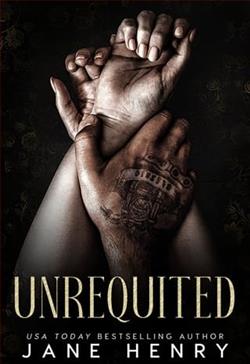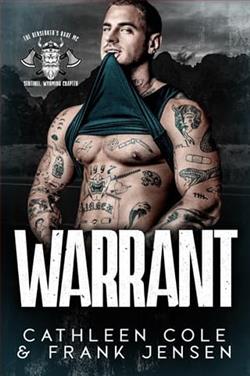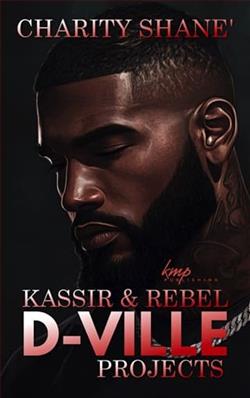Page 75 of DFF: Delicate Freakin' Flower
She snorted. “We haven’t even been properly introduced, have we? I’m Gladys, and I really want to apologize about all of this.”
“Yeah.” I leaned back into the headrest. “Me too.”
I tried to take stock of everything. My body still felt like it had been run over by a freight train, and my thoughts kept slipping around in circles, but the facts remained: I wasn’t in that room anymore. I wasn’t tied up. I wasn’t in Maddox’s control.
Instead, I was in a car being driven by a woman who had probably once survived prohibition and now couldn’t see more than ten feet in front of her.
Was I still unconscious? Was this the plot of a horror movie that I was dreaming about? These felt like a valid questions.
Just then, Gladys swerved sharply to avoid a mailbox—or maybe she was aiming for it—and nearly side-swiped a pickup truck. The driver honked and flipped us off as we jolted into the other lane.
“Oh, hush,” she hissed at him, slapping her horn in retaliation. “People are so rude these days.”
I grabbed the door handle like it might anchor me to life.
So, as it turned out, I wasn’t going to be murdered by a cartel-backed tech mogul after all. No dramatic shootout, no sinister monologue, no international scandal splashed across the headlines. Instead, I was apparently destined to die in a tragic—yet somehow whimsically absurd—automobile accident on the side of a forgotten Florida backroad.
And my co-pilot in this impending disaster? A woman who believed GPS was a government conspiracy and treated traffic signs like polite suggestions she was free to ignore.
Perfect. Just perfect.
“I think we’re being followed,” Gladys said casually as if she were commenting on the weather. She squinted into the rearview mirror, then glanced sideways at me. “It’s probably that awful boy, Clayton Barris. I told Colin I didn’t like him hanging around that one. He's a bad influence.”
I blinked at her. “Clayton Barris?”
“Yes. Always skulking, always whispering. One of those types who never looks you in the eye.” She made a disapproving noise in her throat. “Colin used to bring him around when he was in college. He's like a stray dog that bites.”
My brain stuttered. I couldn't quite wrap my head around her tone—like she was talking about teenage friendships gone bad instead of the man I mentally classified as Maddox’s personal henchman. There was no other word for him. The guy was six foot four, built like a bulldozer, and had all the charm of a prison shiv.
But Gladys spoke like she was reading lines out of a diary from 1973. Maybe it was how she coped. Or perhaps that’s just how mothers worked—clinging to the versions of their children before the world turned them cruel.
“Anyway,” she continued, “we’ll lose him. I’ve still got a few tricks left.”
Then she floored it. Literally.
The car jolted as she slammed the gas pedal down, and I let out a noise that might’ve been a squeak or a very polite scream as we shot down the interstate, weaving between lanes like we were trying out for a demolition derby.
My hand slammed against the door and stayed there, white-knuckled, while my other hand gripped the edge of the seat for dear life.
“I really should go get new glasses,” she muttered. “These are scratched all to hell. Everything looks like it’s wearing a foggy sweater.”
“Please let me drive,” I squealed, my voice coming out higher than I'd intended.
Gladys snorted. “And give Barris a chance to swipe me while we’re switching seats? I don’t think so.”
“I have a head injury,” I argued, trying to breathe through the pounding in my skull. “I should be asleep right now, not living through a high-speed chase with a woman whose lenses are held together with tape.”
“You should be resting, yes, not driving,” she agreed serenely. “You just sit there and stay alive. I’ve got this.”
And she meant it. The way she said it was as if she were trying to mother me. As terrifying as the whole thing was, there was a strange kind of comfort in it. A warped, adrenaline-soaked comfort, but still.
It made me think of my own mom and how I barely talked to her anymore. Not because I didn’t love her but because I couldn’t stomach the man she married. My stepfather had always made me feel like a burden in my own home, so I'd stopped trying to fit in.
Growing up, I’d spent most of my childhood at Sasha’s house instead of my own. It was the kind of home that felt safe the moment you walked through the door—warm, a little chaotic, and filled with the kind of love that didn’t come with conditions. Her two dads had treated me like I was one of their own, never once making me feel like I had to earn my place at the table or prove I was worthy of affection.
They were my sanctuary. My calm in the storm. My safe place.
And if I made it out of this—if I actually lived through this ride from hell—I was going to tell them everything. How much I loved them. How grateful I was. How they’d saved me without ever knowing how badly I needed it.















